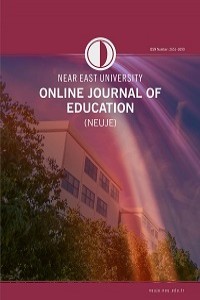SPECIAL EDUCATION TEACHERS’ ATTITUDES TOWARDS DEVELOPING INDIVIDUALIZED EDUCATION PROGRAMS AND CHALLENGES IN THIS PROCESS
SPECIAL EDUCATION TEACHERS’ ATTITUDES TOWARDS DEVELOPING INDIVIDUALIZED EDUCATION PROGRAMS AND CHALLENGES IN THIS PROCESS
Individualized
education programs (IEP) are special education programs which is prepared for
achieving targetted goals for individuals with special needs based on their
developmental characteristics, educational performances and needs and includes
support educational services for them. It is really important to prepare IEP’s
based on the current performance level and needs of the individuals with
special needs. Accordingly, it is considered that attitudes of special
education teachers towards IEP development process and challenges that they
experience in this process are important in terms of the effectiveness of IEP’s
within the scope of this research. Therefore, aim of the present study is to
determine the attitudes of teachers working at special education centers in
Turkish Republic of Northern Cyprus (TRNC) and challenges that teachers
experience during this process. A total number of 65 teachers working at
special education centers in TRNC participated in this study. “Attitudes
towards the IEP Development Process Scale” and “Challenges faced during IEP
Development Process Scale” were used to collect the data of the study. Results
have been discussed with the relevant findings from literature and conclusions
and recommendations have been provided for further research and special
education legislation and practices implemented in TRNC.
___
- Akcamete, G. (2010). Genel egitim okullarinda ozel gereksinimi olan ogrenciler ve ozel egitim. Ankara: Kok Publishing.
- Avcioglu, H. (2015). A’dan z’ye bep: Bireysellestirilmis eğitim programlarının geliştirilmesi. Ankara: Vize Publishing.
- Bafra, L., & Kargin, T. (2009). Investigating the attitudes of elementary school teachers, school psychologists and guidance research center personnel on the process of preparing the individualized educational program and challenges faced during the related process. Educational Sciences: Theory and Practice, 9(4), 1959-1972.
- Baysen, E., & Dakwo, P. E. C. (2018). Content analysis of guidance and psychology -sports and related articles. Near East University Online Journal of Education, 1(1), 20-35.
- Boyle, C., Topping, K., & Jindal-Snape, D. (2013). Teachers’ attitudes towards inclusion in high schools. Teachers and Teaching, 19(5), 527-542.
- Can, B. (2015). Bireysellestirilmis egitim programi ile ilgili ozel egitim ogretmenlerinin yasadiklari sorunlar ve bu sorunlara yonelik cozum onerileri (KKTC ornegi) (Unpublished master thesis). Institute of Educational Sciences, Near East University, TRNC.
- Cook, R. E., Klein, M. D., & Chen, D. (2015). Adapting early childhood curricula for children with special needs. UK: Pearson.
- Karasar, N. (2009). Bilimsel arastirma yontemi: Kavramlar-ilkeler-teknikler. Ankara: Nobel Yayin Dağitim.
- Kargın, T. (2007). Egitsel degerlendirme ve bireysellestirilmis egitim programi hazırlama sureci. Ankara Universitesi Egitim Bilimleri Fakultesi Ozel Egitim Dergisi, 8(1), 1-15.
- Kauffman, J. M., Hallahan, D. P., Pullen, P. C., & Badar, J. (2018). Special education: What it is and why we need it. London: Routledge.
- Lee-Tarver, A. (2006). Are ındividualized education plans a good thing? A survey of teachers' perceptions of the utility of ıeps in regular education settings. Journal of Instructional Psychology, 33(4), 263-272.
- Martinez, R. S. (2004). General education teachers' attitudes toward inclusion: Implications for school psychologists. In Communique, 33(2) 16-17.
- Meyen, E. L., & Bui, Y. N. (2007). Exceptional children in today's schools: What teachers need to know. Denver, CO: Love Publishing.
- Ozyurek, M. (2006). Engellilere yonelik tutumlarin degistirilmesi. Ankara: Kok Publishing.
- Pretti-Frontczak, K., & Bricker, D. (2000). Enhancing the quality of individualized education plan (IEP) goals and objectives. Journal of Early Intervention, 23(2), 92-105.
- ISSN: 2651-3099
- Başlangıç: 2018
- Yayıncı: Yakın Doğu Üniversitesi
